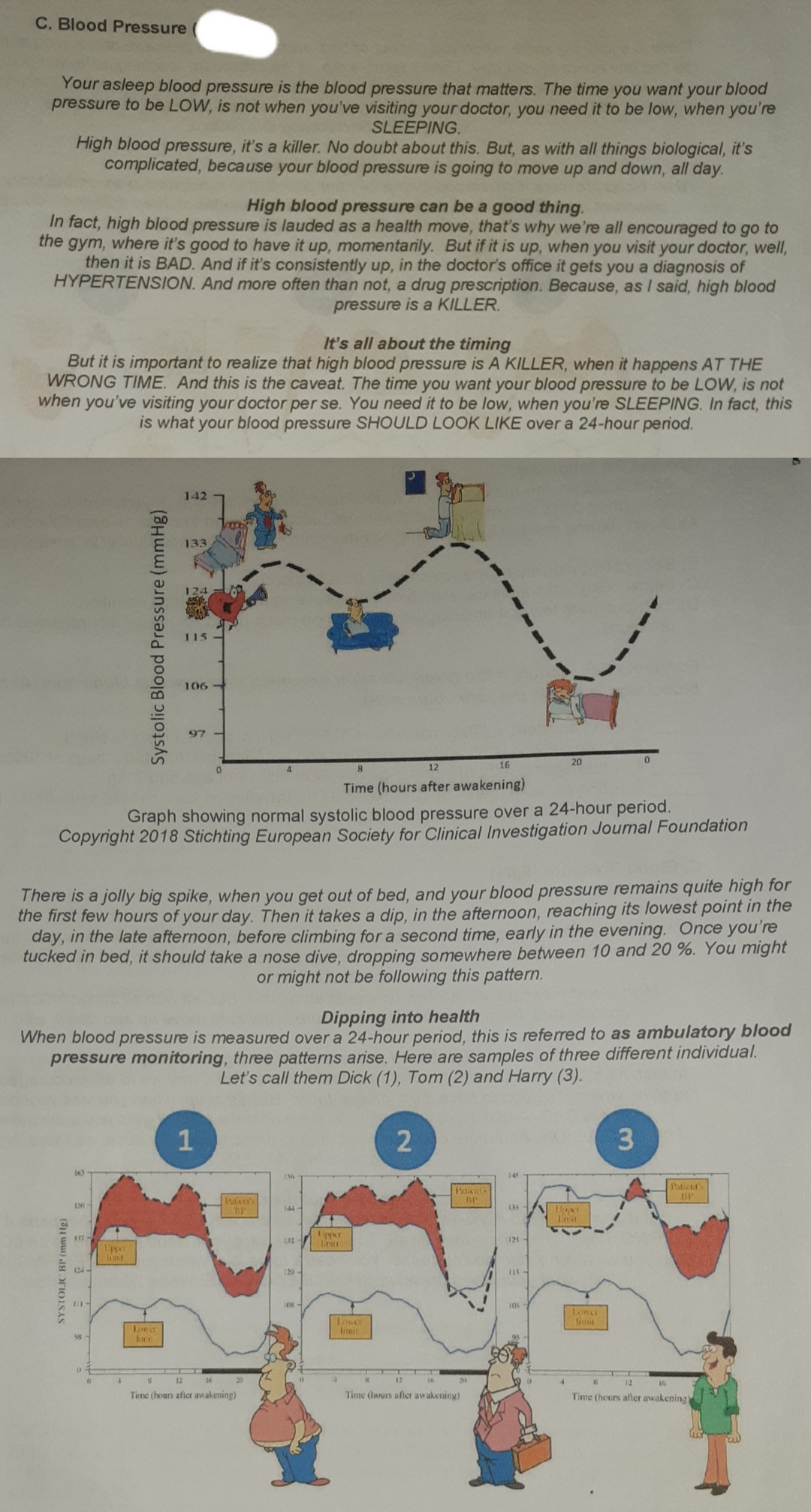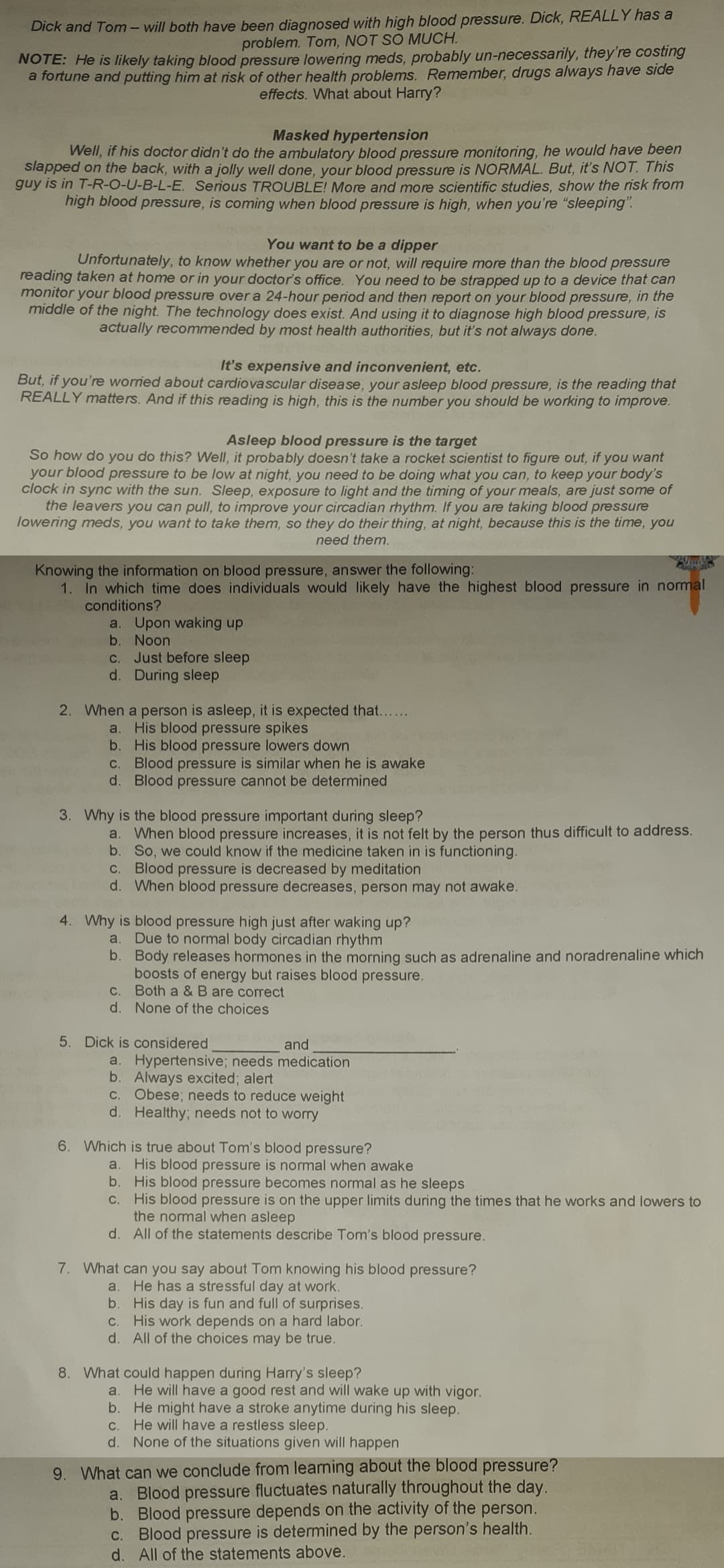the information on blood pressure, answer the following: which time does individuals would likely have the highest blood pressure in nor onditions? a. Upon waking up
the information on blood pressure, answer the following: which time does individuals would likely have the highest blood pressure in nor onditions? a. Upon waking up
Chapter14: Circulation And Blood Vessels
Section: Chapter Questions
Problem 3ATC
Related questions
Question

Transcribed Image Text:C. Blood Pressure
Your asleep blood pressure is the blood pressure that matters. The time you want your blood
pressure to be LOW, is not when you've visiting your doctor, you need it to be low, when you're
SLEEPING.
High blood pressure, it's a killer. No doubt about this. But, as with all things biological, it's
complicated, because your blood pressure is going to move up and down, all day.
High blood pressure can be a good thing.
In fact, high blood pressure is lauded as a health move, that's why we're all encouraged to go to
the gym, where it's good to have it up, momentarily. But if it is up, when you visit your doctor, well,
then it is BAD. And if it's consistently up, in the doctor's office it gets you a diagnosis of
HYPERTENSION. And more often than not, a drug prescription. Because, as I said, high blood
pressure is a KILLER.
It's all about the timing
But it is important to realize that high blood pressure is A KILLER, when it happens AT THE
WRONG TIME. And this is the caveat. The time you want your blood pressure to be LOW, is not
when you've visiting your doctor per se. You need it to be low, when you're SLEEPING. In fact, this
is what your blood pressure SHOULD LOOK LIKE over a 24-hour period.
142
133
115
106
97
16
20
12
Time (hours after awakening)
Graph showing normal systolic blood pressure over a 24-hour period.
Copyright 2018 Stichting European Society for Clinical Investigation Journal Foundation
There is a jolly big spike, when you get out of bed, and your blood pressure remains quite high for
the first few hours of your day. Then it takes a dip, in the afternoon, reaching its lowest point in the
day, in the late afternoon, before climbing for a second time, early in the evening. Once you're
tucked in bed, it should take a nose dive, dropping somewhere between 10 and 20 %. You might
or might not be following this pattern.
Dipping into health
When blood pressure is measured over a 24-hour period, this is referred to as ambulatory blood
pressure monitoring, three patterns arise. Here are samples of three different individual.
Let's call them Dick (1), Tom (2) and Harry (3).
1
3
Patiest's
BP
Pticats
Pudiver's
BP
130
144
135
Init
pper
tin
A17
132
125
Upper
lint
124-
120
18-
Lonci
timit
Lowe
limit
Loner
55
12
16
12
20
16
Time (hours afler awakening)
Time (hours afler awakening)
Time (hours after awakening)
SYSTOLIC BP (mm Hg)
Systolic Blood Pressure (mmHg)
2)

Transcribed Image Text:Dick and Tom- will both have been diagnosed with high blood pressure. Dick, REALLY has a
problem. Tom, NOT SO MUCH.
NOTE: He is likely taking blood pressure lowering meds, probably un-necessarily, they're costing
a fortune and putting him at risk of other health problems. Remember, drugs always have side
effects. What about Harry?
Masked hypertension
Well, if his doctor didn't do the ambulatory blood pressure monitoring, he would have been
slapped on the back, with a jolly well done, your blood pressure is NORMAL. But, it's NOT. This
guy is in T-R-O-U-B-L-E. Serious TROUBLE! More and more scientific studies, show the risk from
high blood pressure, is coming when blood pressure is high, when you're "sleeping".
You want to be a dipper
Unfortunately, to know whether you are or not, will require more than the blood pressure
reading taken at home or in your doctor's office. You need to be strapped up to a device that can
monitor your blood pressure over a 24-hour period and then report on your blood pressure, in the
middle of the night. The technology does exist. And using it to diagnose high blood pressure, is
actually recommended by most health authorities, but it's not always done.
It's expensive and inconvenient, etc.
But, if you're worried about cardiovascular disease, your asleep blood pressure, is the reading that
REALLY matters. And if this reading is high, this is the number you should be working to improve.
Asleep blood pressure is the target
So how do you do this? Well, it probably doesn't take a rocket scientist to figure out, if you want
your blood pressure to be low at night, you need to be doing what you can, to keep your body's
clock in sync with the sun. Sleep, exposure to light and the timing of your meals, are just some of
the leavers you can pull, to improve your circadian rhythm. If you are taking blood pressure
lowering meds, you want to take them, so they do their thing, at night, because this is the time, you
need them.
Knowing the information on blood pressure, answer the following:
1. In which time does individuals would likely have the highest
pressure in normal
conditions?
a. Upon waking up
b. Noon
C. Just before sleep
d. During sleep
2. When a person is asleep, it is expected that....
His blood pressure spikes
b. His blood pressure lowers down
C. Blood pressure is similar when he is awake
d. Blood pressure cannot be determined
a.
3. Why is the blood pressure important during sleep?
a. When blood pressure increases, it is not felt by the person thus difficult to address.
b. So, we could know if the medicine taken in is functioning.
c. Blood pressure is decreased by meditation
d. When blood pressure decreases, person may not awake.
4. Why is blood pressure high just after waking up?
a. Due to normal body circadian rhythm
b. Body releases hormones in the morning such as adrenaline and noradrenaline which
boosts of energy but raisess blood pressure.
C. Both a & B are correct
d. None of the choices
5. Dick is considered
and
a. Hypertensive; needs medication
b. Always excited; alert
Obese; needs to reduce weight
d. Healthy; needs not to worry
С.
6. Which is true about Tom's blood pressure?
His blood pressure is normal when awake
b. His blood pressure becomes normal as he sleeps
C. His blood pressure is on the upper limits during the times that he works and lowers to
the normal when asleep
d. All of the statements describe Tom's blood pressure.
a.
7. What can you say about Tom knowing his blood pressure?
a. He has a stressful day at work.
b.
His day is fun and full of surprises.
C. His work depends on a hard labor.
d. All of the choices may be true.
8. What could happen during Harry's sleep?
a. He will have a good rest and will wake up with vigor.
b. He might have a stroke anytime during his sleep.
C. He will have a restless sleep.
d. None of the situations given will happen
9. What can we conclude from learning about the blood pressure?
a. Blood pressure fluctuates naturally throughout the day.
b. Blood pressure depends on the activity of the person.
c. Blood pressure is determined by the person's health.
d. All of the statements above.
Expert Solution
This question has been solved!
Explore an expertly crafted, step-by-step solution for a thorough understanding of key concepts.
This is a popular solution!
Trending now
This is a popular solution!
Step by step
Solved in 2 steps

Knowledge Booster
Learn more about
Need a deep-dive on the concept behind this application? Look no further. Learn more about this topic, biology and related others by exploring similar questions and additional content below.Recommended textbooks for you



Human Physiology: From Cells to Systems (MindTap …
Biology
ISBN:
9781285866932
Author:
Lauralee Sherwood
Publisher:
Cengage Learning



Human Physiology: From Cells to Systems (MindTap …
Biology
ISBN:
9781285866932
Author:
Lauralee Sherwood
Publisher:
Cengage Learning

Medical Terminology for Health Professions, Spira…
Health & Nutrition
ISBN:
9781305634350
Author:
Ann Ehrlich, Carol L. Schroeder, Laura Ehrlich, Katrina A. Schroeder
Publisher:
Cengage Learning

Human Biology (MindTap Course List)
Biology
ISBN:
9781305112100
Author:
Cecie Starr, Beverly McMillan
Publisher:
Cengage Learning
